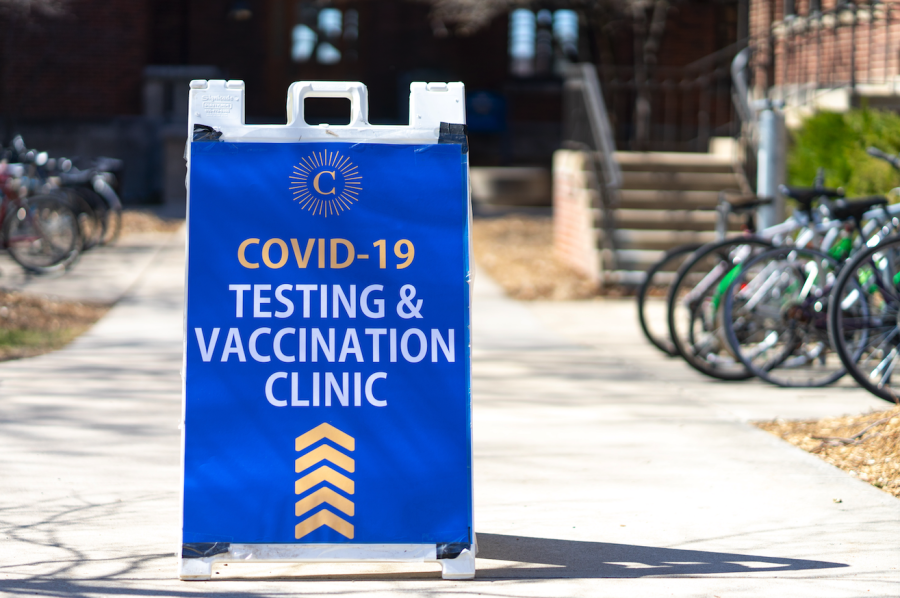Chances are high that Carleton students know of at least one person who has been listed as a COVID-19 close contact in the past two weeks. After a relatively COVID-free start to the term, with an average of 1.7 cases per week since September 15, cases have drastically risen, with eight reported cases detected from October 23 to 29.
Since then, even more cases have been reported. According to Dean of Students Carolyn Livingston, who is also a member of Carleton’s COVID-19 Core Team, there are currently ten students and one alumna in isolation. That said, it appears that those who have tested positive are not experiencing drastic symptoms.
“Symptoms are mild,” said Livingston. “Students experiencing symptoms have described a sore throat, a runny or stuffy nose and a cough. Several students who have tested positive are asymptomatic.”
Sophia Quast ’23, who tested positive for COVID-19 last week concurred: “I was asymptomatic for most of the time—I started getting a cough in the nighttime towards the end of quarantine, but other than that, I felt pretty good!”
The reach of these positive cases has been campus-wide. “201 individuals have been identified as close contacts. All close contacts were notified immediately and asked to mask at all times except when eating and sleeping, socially distance when possible and get tested in the COVID Rapid Testing Center,” Livingston further explained.
Having close contacts mask has been relatively effective at limiting COVID-19 exposure. Explains Quast, “I was able to identify ‘close contacts’’ as defined by the Carleton contact tracing team. Because my roommate had tested positive earlier in the week, I was being conscious of masking indoors, limiting socializing indoors unmasked for more than 15 minutes and keeping track of who I was around. Thankfully none of my close contacts have tested positive.”
Ella Hein ’23, another student who tested positive for COVID-19, expressed concern regarding the lack of support given to close contacts. “I personally wish my close contacts had more support in navigating their interactions and on campus,” said Hein. “Because they hadn’t actually contracted COVID, they didn’t receive any of the academic or social support that I did.”
These current expectations and procedures for close contacts differ dramatically from last year’s, where all close contacts had to move into quarantine housing for 14 days. This change in procedure is thanks to the added protection provided by COVID-19 vaccines, which the vast majority of Carleton students have received. Now, only those who test positive are moved into dedicated isolation housing.
“My quarantine experience has actually been quite enjoyable. The Carleton COVID support team has been very accommodating and helpful,” describes Quast . “Shoutout to Kari Scheurer from the Dean of Students Office for delivering meals and Halloween treats, and always being available to help. The quarantine house I was placed in was really spacious and warm, and, thankfully, my housemate and I got along well!”
At publishing time, it is unclear what caused this spike in cases. According to Dean Livingston, all of the cases have been “social in nature.” This lack of information regarding the cause of this increase has led students to speculate. Some, like Samuel Wege ’22, hypothesize that Midterm Break was the potential cause.
“While Family Weekend is one factor that perhaps attributed to this—with the college neither requiring family members to be vaccinated nor enforceably mandating visitors to get tested —there is also an increase in social programming for, and among, students over that long weekend, including class/departmental field trips and broader socialization on campus,” he said.
Students have also expressed complaints about how the college has handled this spike in cases.
“While I trust that the school’s approaches to contact tracing and quarantine have been approved by medical experts as safe, students are really left to their own devices, with ranging integrity, to keep their peers safe,” added Wege. “As for student mental wellbeing: there has been an unbelievable dearth of communication from the school as rumors abound on campus. Close contacts are informed without ever being told from whom or how they may have contracted COVID, left to frantically reach out to their known contacts searching for the trace; this panicked response naturally incited further panic in all those other contacts.”
Hein ’23 shared similar worries. “I think fearing COVID on campus is a rational fear,” she said. “But the tension on campus and scrutiny of my close contacts could have been relieved with more communication and support coming from the college.”
According to COVID-19 Core Team Member, Erin Runestad, the Carleton community should expect a campus-wide update on COVID-19 procedures coming soon.










